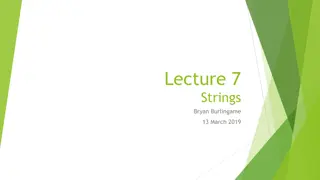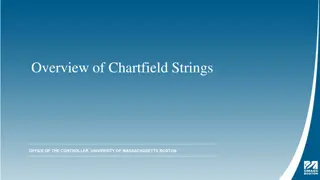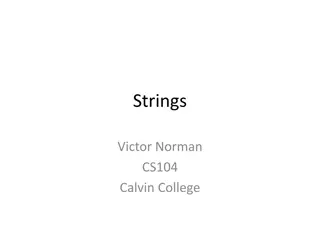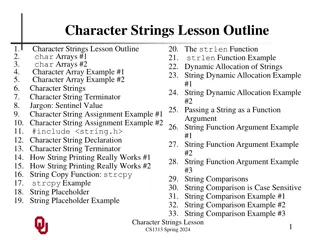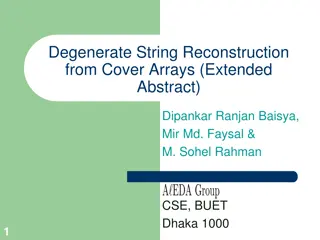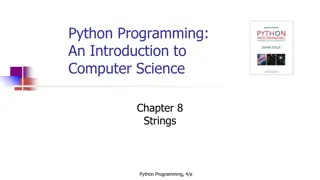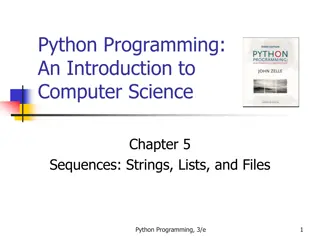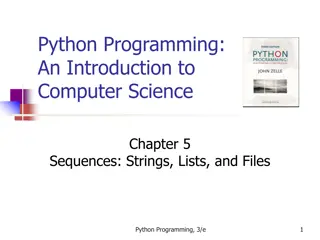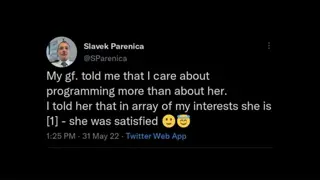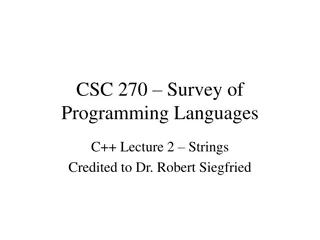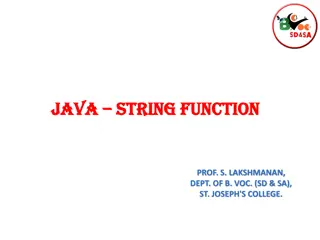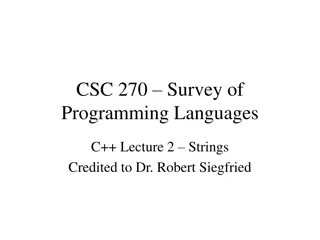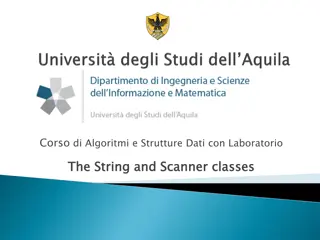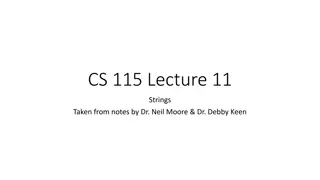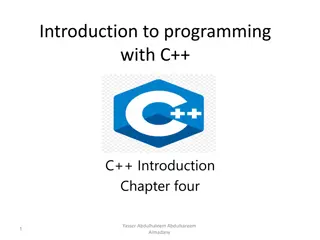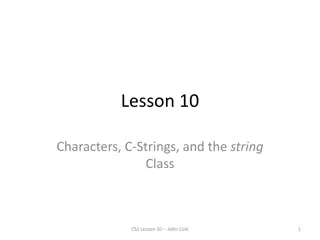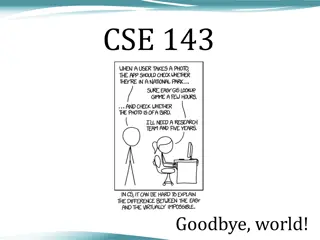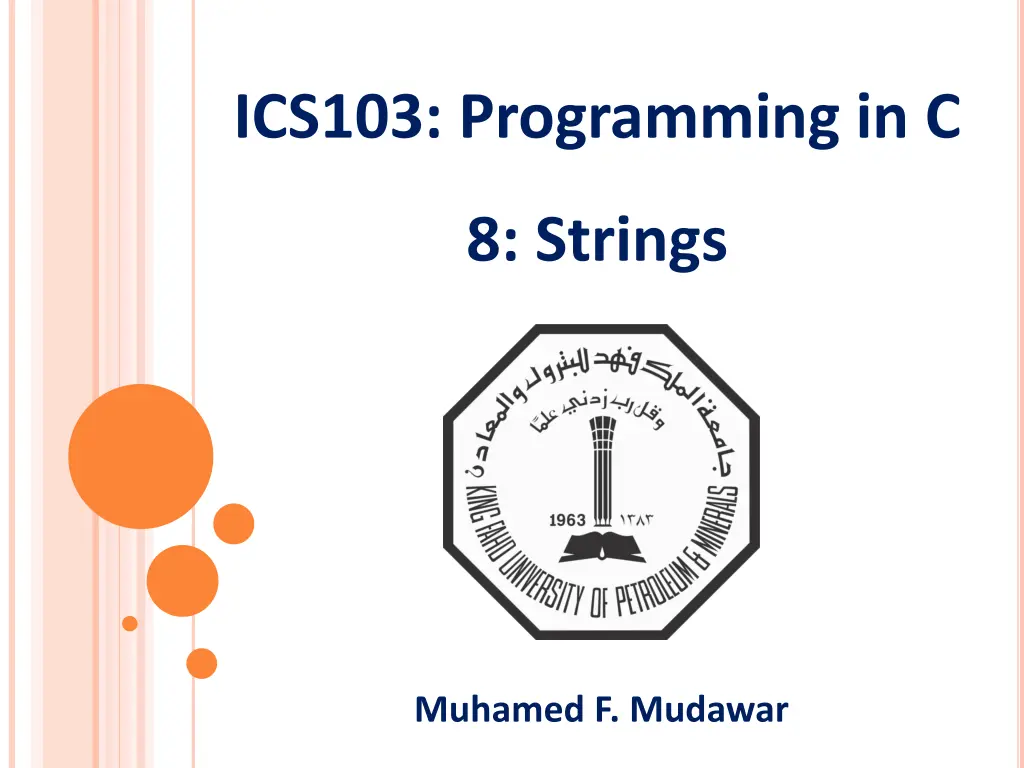
Understanding Strings in C Programming
Learn about string constants, string variables, the null character, and how strings are represented and manipulated in C programming. Explore string declarations, initialization, pointers, and the importance of the null character in handling strings.
Download Presentation

Please find below an Image/Link to download the presentation.
The content on the website is provided AS IS for your information and personal use only. It may not be sold, licensed, or shared on other websites without obtaining consent from the author. If you encounter any issues during the download, it is possible that the publisher has removed the file from their server.
You are allowed to download the files provided on this website for personal or commercial use, subject to the condition that they are used lawfully. All files are the property of their respective owners.
The content on the website is provided AS IS for your information and personal use only. It may not be sold, licensed, or shared on other websites without obtaining consent from the author.
E N D
Presentation Transcript
ICS103: Programming in C 8: Strings Muhamed F. Mudawar
OUTLINE String Constants and Variables String Input and Output Character Related Functions String Library Functions Arrays of Strings and Arrays of Pointers 2
WHATISA STRING CONSTANT? A sequence of characters enclosed in double quotes Example: "Hello World" Can be used in a printf statement: printf("Average = %.2f\n", avg); Can also appear in #define directive, such as: #define ERR_MSG "Error message: " 3
WHATISA STRING VARIABLE? In C, a stringvariable is an array of type char We can declare a string variable as follows: char string_var[20]; /* Array of char */ We can initialize a string variable as follows: /* A list of chars terminated by '\0' */ char str[16] = {'H','e','l','l','o',' ', 'W','o','r','l','d','\0'}; /* A string enclosed between double quotes */ char str[16] = "Hello World"; 0 1 2 3 4 5 6 7 8 9 10 11 12 ? 13 ? 14 ? 15 ? 4 H e l l o W o r l d \0 array str[16]
STRING VARIABLES (CONT'D) We can omit the string (array) size as follows: char str2[] = "Hello World"; /* 12 chars */ Only 12 characters are allocated (including '\0') 0 1 2 3 4 5 6 7 8 9 10 11 H e l l o W o r l d \0 array str2[] We can also declare a pointer to a string as follows: char *ptr = "Hello World"; ptr 0 1 2 3 4 5 6 7 8 9 10 11 5 H e l l o W o r l d \0 string constant
THE NULL CHARACTER '\0' It is a byte that has the value zero Used to mark the end of a string in C A string constant is always ended with '\0' For example: "Hello World" has 12 chars (not 11) 0 1 2 3 4 5 6 7 8 9 10 11 H e l l o W o r l d \0 C functions use '\0' to compute the string length To avoid passing the size of a string to a function A string variable must also terminate with a NULL char 6 The empty string "" stores the NULL char '\0'
NEXT . . . String Constants and Variables String Input and Output Character Related Functions String Library Functions Arrays of Strings and Arrays of Pointers 7
INPUTA STRINGWITHscanf To input a string, the placeholder must be %s char str[16]; /* str length must not exceed 15 chars */ scanf("%s", str); /* when reading a string, scanf skips white */ /* space such as blanks, newlines, and tabs */ /* It stops reading at first white space */ /* It inserts '\0' at end of str */ scanf("%15s", str); /* prevents reading more than 15 chars */ Notice that there is no need for & before str 8 Because str is an array, and it is passed by address
OUTPUTA STRINGWITHprintf To print a string, the placeholder must also be %s Example of string input and output: char str[16]; /* must not exceed 15 chars */ printf("Enter your first name: "); scanf("%15s", str); printf("Hello %s\n", str); If printf displays a string that does not end with '\0' then it causes a run-time error 9
EXAMPLEOF STRING INPUT / OUTPUT #include <stdio.h> int main(void) { char dept[8], days[8]; int course_num, time; printf("Enter course code, number, days, and time\n"); printf("Similar to this: MATH 101 UTR 1100\n"); printf("\n> "); scanf("%s%d%s%d", dept, &course_num, days, &time); printf("%s %d meets %s at %d\n", dept, course_num, return 0; } days, time); 10
PLACEHOLDERS USEDWITHprintf Placeholder Output ( is blank) Value 'a' %c %3c %-3c a a a -10 %d %6d %-6d -10 -10 -10 49.76 %.3f %9.1f %9.2e 49.760 49.8 4.98e+01 "fantastic" %s %12s %-12s fantastic fantastic fantastic 11
THEgetsANDputsFUNCTIONS A problem with scanf it that it stops reading a string when it encounters a blank (or any whitespace). Blanks are natural separators between numeric data values, but it is a valid character in a string. To read a full line, the gets function continues reading until the newline char (Enter key) is read. The '\n' character representing the Enter key is not stored in the string. It is replaced with '\0'. The puts function is used to print a string. 12 puts automatically prints '\n' at end of the string.
EXAMPLEOFgetsANDputs char line[80]; printf("Type anything: "); gets(line); printf("You typed: "); puts(line); 13
FILE INPUTWITHfgets For data files, the stdio library provides the fgets function that works similar to gets char * fgets(char str[], int n, FILE *infile); fgets reads characters from infile into str, until it reads'\n' or n-1 chars, whichever comes first. fgets inserts '\0' at end of str Unlike gets, fgets reads the '\n' char into str fgets returns the address of str as its result value If fgets cannot read from infile (End-Of-File or some error) then it returns the NULL pointer 14
FILE OUTPUTWITHfputs In addition, the stdio library provides the fputs function that works similar to puts int fputs(char str[], FILE *outfile); fputs outputs str to outfile Unlike puts, fputs does not output an extra newline character to outfile fputs returns 0 if the file operation is successful 15 It returns -1 if it cannot write to outfile
EXAMPLEOFfgetsANDfputs #include <stdio.h> #define L_SIZE 100 /* line size */ #define N_SIZE 40 /* name size */ int main() { char line[L_SIZE], inname[N_SIZE], outname[N_SIZE]; printf("Enter the name of input file: "); scanf("%s", inname); FILE *infile = fopen(inname, "r"); if (infile == NULL) { printf("Can't open %s", inname); return 1; /* terminate program */ } 16 printf("Enter the name of output file: "); scanf("%s", outname);
EXAMPLEOFfgetsANDfputs FILE *outfile = fopen(outname, "w"); if (outfile == NULL) { printf("Can't open %s", outname); return 1; /* terminate program */ } char *status = fgets(line, L_SIZE, infile); while (status != NULL) { fputs(line, outfile); status = fgets(line, L_SIZE, infile); } fclose(infile); fclose(outfile); 17 return 0; }
NEXT . . . String Constants and Variables String Input and Output Character Related Functions String Library Functions Arrays of Strings and Arrays of Pointers 19
CHARACTER RELATED FUNCTIONS In addition to the string library functions, C provides functions that facilitate character handling. To use these functions #include <ctype.h> Function int isalnum(ch); int isalpha(ch); int isdigit(ch); int isupper(ch); int islower(ch); int isspace(ch); int iscntrl(ch); int ispunct(ch); int toupper(ch); int tolower(ch); Description true if ch is alphanumeric true if ch is alphabetic true if ch is digit true if ch is uppercase letter true if ch is lowercase letter true if ch is whitespace true if ch is a control character true if ch is a punctuation character convert ch to uppercase convert ch to lowercase 20
CONVERTINGA STRINGTO UPPERCASE #include <stdio.h> #include <ctype.h> int main() { char s[] = "ICS 103: Computer Programming in C"; int i; for (i=0; s[i] != '\0'; i++) s[i] = toupper(s[i]); puts(s); printf("The digits in the string are: "); for (i=0; s[i] != '\0'; i++) if (isdigit(s[i])) printf("%c", s[i]); printf("\n"); return 0; } 21
COUNTING LETTERS, DIGITS, SPACES, . . . #include <stdio.h> #include <ctype.h> int main() { char line[100]; int letters=0, digits=0, spaces=0, puncts=0, others=0; int i, total=0; printf("Type anything on the next line . . .\n"); gets(line); for (i=0; line[i] !='\0'; i++) { total++; if (isalpha(line[i])) letters++; else if (isdigit(line[i])) digits++; 22
COUNTING LETTERS, DIGITS, SPACES, . . . else if (isspace(line[i])) spaces++; else if (ispunct(line[i])) puncts++; else others++; } printf("\nYou typed %d chars\n", total); printf("The count of letters = %d\n", letters); printf("The count of digits = %d\n", digits); printf("The count of spaces = %d\n", spaces); printf("Punctuation chars = %d\n", puncts); printf("Other characters = %d\n", others); return 0; 23 }
COUNTING VOWELS #include <stdio.h> int isvowel(char ch); /* Function Prototype */ int main( ) { char line[100]; int i, vowels=0; printf("Type anything on the next line . . .\n"); gets(line); for (i=0; line[i] != '\0'; i++) if (isvowel(line[i])) vowels++; printf("\nNumber of vowels = %d\n", vowels); return 0; } 25
FUNCTIONisvowel /* Returns true if character ch is a vowel */ int isvowel(char ch) { return (ch == 'a' || ch == 'A' || ch == 'e' || ch == 'E' || ch == 'i' || ch == 'I' || ch == 'o' || ch == 'O' || ch == 'u' || ch == 'U') ; } 26
NEXT . . . String Constants and Variables String Input and Output Character Related Functions String Library Functions Arrays of Strings and Arrays of Pointers 27
STRING LIBRARY FUNCTIONS The standard C library contains useful string functions Can be used by including the following header file: #include <string.h> Here, we look at few string library functions: strcpy, strlen, strcmp, strcat, strtok, strchr, strstr The full list is available in appendix B The string library functions expects all strings to be terminated with the null character '\0' 28
STRING COPY: strcpy We typically use = to copy data into a variable char c, t[16], s[16] = "Example string"; c = 'a'; /* this is ok */ t = "Test string"; /* this does not work */ t = s; /* this does not work */ We can use = to initialize a string, but not to assign To assign a string, use the string copy function strcpy copies the src string into the dest string: char *strcpy(char dest[], char src[]); strcpy copies all characters in the src string up to and including the null char into the dest string 29
EXAMPLES: strcpy char t[16], s[16] = "Example string"; 0 1 2 3 4 5 6 7 8 9 10 11 12 13 14 15 ? E x a m p l e array s[16] s t r i n g \0 strcpy(t, "Test string"); 0 1 2 3 4 5 6 7 8 9 10 11 12 ? 13 ? 14 ? 15 ? T e s t s t array t[16] r i n g \0 strcpy(t, s); 0 1 2 3 4 5 6 7 8 9 10 11 12 13 14 15 ? 30 E x a m p l e array t[16] s t r i n g \0
STRING LENGTH: strlen strlen counts the number of characters in a string that appear before the null character '\0' int strlen(char s[]); The null character is NOT counted The empty string "" that starts with a null character has a strlen equal to 0 Examples: char s1[20] = "", s2[20] = "KFUPM, Dhahran" int len1 = strlen(s1); /* returns 0 */ 31 int len2 = strlen(s2); /* returns 14 */
STRING COMPARISON: strcmp Characters are represented by numeric codes We can compare characters using relational operators For example: if (ch1 < ch2) { . . . } However, if str1 and str2 are arrays of characters We cannot compare strings like this: (str1<str2) To compare two strings, we use the strcmp function int strcmp(char str1[], char str2[]); Compares the two strings alphabetically (ASCII codes) Returns 0if str1 is equal to str2 Returns -1if str1 is less thanstr2 32 Returns +1if str1 is greater thanstr2
EXAMPLES: strcmp char s1[16] = "Long string"; char s2[16] = "Short"; char s3[16] = "short"; char s4[16] = ""; printf("%d ", strcmp(s1, s2)); printf("%d ", strcmp(s2, s3)); printf("%d ", strcmp(s3, s4)); printf("%d ", strcmp(s4, s4)); 33
STRING CONCATENATION: strcat Concatenation means appending a source string at the end of a destination string to make it longer. char * strcat(char dest[], char src[]); The src string is copied at the end of the dest string The position of the null char in the dest string is set after the appended copy of the src string. Overflow is possible if the dest string does not have sufficient space to append the src string. If overflow happens, other variables can be overwritten, which might cause a runtime error 34
EXAMPLE: strcat #include <stdio.h> #include <string.h> int main(void) { char first[20], last[20], full[40]; printf("Enter your first name: "); gets(first); printf("Enter your last name: "); gets(last); strcpy(full, first); strcat(full, " "); strcat(full, last); printf("Your full name is: "); puts(full); return 0; } 35
STRING TOKENIZATION: strtok Tokenization means splitting a string into parts called tokens based on a specified set of delimiters. char * strtok(char str[], char delims[]); The first call to strtok should have str point to the string to be tokenized Subsequent calls to strtok must use NULL as str The strtok function returns a pointer to the next token in str that ends with a delimiter in delims It modifies str by replacing delimiters with '\0' 36 It returns NULL when tokens are exhausted
EXAMPLE: strtok #include <stdio.h> #include <string.h> int main(void) { char date[20]; printf("Enter a date like this: May 5, 2014\n> "); gets(date); char *month = strtok(date, " ,"); /* first call */ char *day = strtok(NULL, " ,"); /* subsequent call */ char *year = strtok(NULL, " ,"); /* subsequent call */ month day year puts(month); puts(day); puts(year); return 0; } \ 0 \ 0 2 0 1 9 ,\ \ 0 0? ? J a n u a r y 2 5 , 37 array date[20]
SEARCHINGA STRING Two functions for searching a string: char * strchr(char str[], char target); char * strstr(char str[], char target[]); strchr returns a pointer to the first occurrence of target char in str, or NULL if target is not found strstr returns a pointer to the first occurrence of target string in str, or NULL if no match is found 38
EXAMPLEOFstrstr #include<stdio.h> #include<string.h> int main(void) { char sentence[100], word[40], *result; printf("Enter a sentence: "); gets(sentence); printf("Enter a word to search: "); gets(word); result = strstr(sentence, word); if (result != NULL) printf("%s was found\n", word); else printf("%s was not found\n", word); 39 return 0; }
NEXT . . . String Constants and Variables String Input and Output Character Related Functions String Library Functions Arrays of Strings and Arrays of Pointers 40
ARRAYSOF STRINGS An array of strings is a 2D array of characters The first dimension represents the number of strings The second dimension represents the string itself Example: declare an array to store up to 30 names, each of size 20 chars (including null character) #define MAX_NAMES 30 #define NAME_SIZE 20 . . . 41 char names[MAX_NAMES][NAME_SIZE];
ARRAYSOF POINTERS An array of pointers is a 1D array of addresses char *ptr[30]; /* array of 30 pointers */ Initializing an array of strings: char month[12][10] = {"January", "February", "March", "April", "May", "June", "July", "August", "September", "October", "November", "December" }; Initializing an array of pointers: char *month[12] = { "January", "February", "March", "April", "May", "June", "July", "August", "September", "October", "November", "December" }; 42
ARRAYOF STRINGSVERSUS POINTERS char month[12][10] char *month[12] J a n u a r y \0 "January" F e b r u a r y \0 "February" M a r c h \0 "March" A p r i l \0 "April" M a y \0 "May" J u n e \0 "June" J u l y \0 "July" A u g u s t \0 "August" S e p t e m b e r \0 "September" O c t o b e r \0 "October" N o v e m b e r \0 "November" 43 D e c e m b e r \0 "December"
SORTINGAN ARRAYOF NAMES (1 OF 4) /* Sort an array of names alphabetically */ #include <stdio.h> #include <string.h> #define MAX_NAMES 30 /* maximum number of names */ #define NAME_SIZE 20 /* maximum name size */ /* read n names into array of strings */ void read_names(char array[][NAME_SIZE], int n); /* print an array of n names */ void print_names(char array[][NAME_SIZE], int n); /* sort an array of n names alphabetically */ void sort_names(char array[][NAME_SIZE], int n); 44
SORTINGAN ARRAYOF NAMES (2 OF 4) /* main function */ int main() { int total; char name[MAX_NAMES][NAME_SIZE]; printf("Enter total number of names: "); scanf("%d", &total); read_names(name, total); sort_names(name, total); printf("\nAlphabetical sorting of names\n\n"); print_names(name, total); 45 return 0; }
SORTINGAN ARRAYOF NAMES (3 OF 4) /* read n names into array of strings */ void read_names(char array[][NAME_SIZE], int n) { int i; for (i=0; i<n; i++) { printf("Enter name[%d]: ", i); scanf("%s", array[i]); } } /* print an array of n names */ void print_names(char array[][NAME_SIZE], int n) { int i; for (i=0; i<n; i++) puts(array[i]); } 46
SORTINGAN ARRAYOF NAMES (4 OF 4) void sort_names(char array[][NAME_SIZE], int n) { int fill, index_min, j; char temp_name[NAME_SIZE]; /* temporary name */ for (fill=0; fill < n-1; fill++) { index_min = fill; for (j=fill+1; j<n; j++) { if (strcmp(array[j], array[index_min]) < 0) index_min = j; /* found a new min */ } } } strcpy(temp_name, array[fill]); strcpy(array[fill], array[index_min]); strcpy(array[index_min], temp_name); 47

